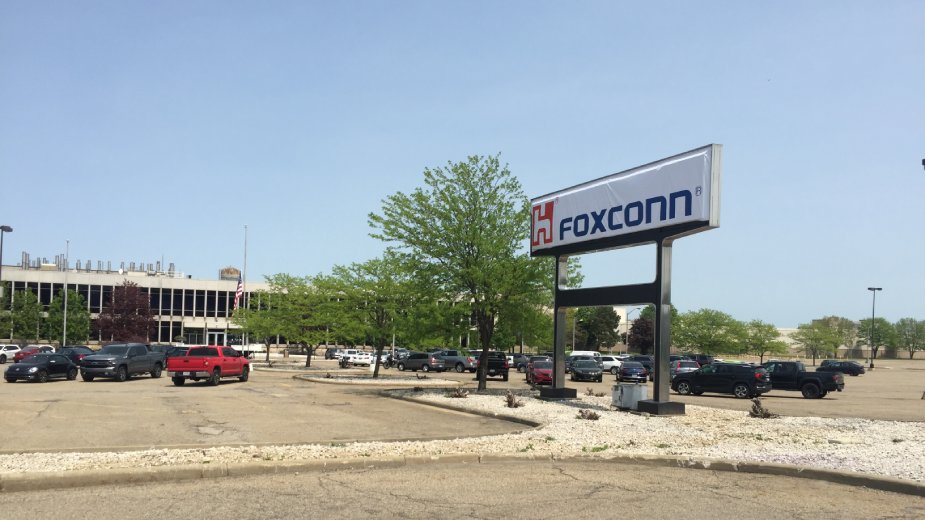LORDSTOWN – Foxconn is asking the U.S. Bankruptcy Court in Delaware to dismiss Lordstown Motors Corp.’s Chapter 11 petition or convert it to Chapter 7 liquidation.
The motion was filed July 20 by Hon Hai Technology Group, Foxconn EV Technology Inc. and Foxconn EV System LLC. Court papers assert that Lordstown Motors sought Chapter 11 protection “in bad faith and without a valid bankruptcy purpose.”
The EV startup has “a substantial or continuing loss” that diminishes its assets,” Foxconn’s motion states. “There is no viable business to sell. … The debtors cannot rehabilitate. Sale prospects are illusory.”
Lordstown Motors sued Foxconn on June 27, the same day it filed Chapter 11. The company accused Foxconn, in an adversary complaint connected to the bankruptcy petition, of fraud, bad faith and contractual breaches that “destroyed the company’s business and future.”
Foxconn describes Lordstown Motors as a “sinking ship that management ran into the rocks.” Lordstown Motors projected that it would turn out 31,600 trucks in 2022 and 65,000 in 2023, Foxconn’s motion notes, citing promises to investors.
Yet as of June 27, the company had “produced only 65 trucks, despite having burned through approximately $750 million in capital – an astounding $11.5 million per truck.”
Foxconn’s 32-page motion is a point-by-point indictment of Lords-town Motors for a “fundamentally flawed and failed business model that, by the debtor’s own admission, has no prospect of a turnaround or return to operations.”
Lordstown filed bankruptcy “solely for the purpose of obtaining a tactical litigation advantage,” Foxconn’s motion begins.
“Tellingly, Lordstown did not seek Chapter 11 relief until it was prepared to file suit against Foxconn. Lordstown did not seek Chapter 11 protection when it was on the eve of a trade secrets trial against a competitor in which it faces a potential judgment in excess of $900 million. Lordstown did not seek Chapter 11 protection when it was facing multiple securities lawsuits based on the alleged fraudulent statements and disclosures of its former principals. Lordstown did not seek Chapter 11 protection when it determined that it was fundamentally incapable of building and selling its sole product for a profit, and thus had to wind down operations. But when Foxconn rightfully refused to fund additional capital into Lordstown’s failing business,” Lordstown decided to seek the “benefits and protections of the bankruptcy code and sue Foxconn in a favored forum. This is the epitome of bad faith forum shopping …”
Foxconn purchased the former General Motors plant from Lordstown Motors in May 2022 for $230 million. The deal included a contract manufacturing agreement whereby Foxconn would build the Endurance pickup. Initially, the parties also signed a joint venture agreement that called for collaboration on future EV products.
The joint venture subsequently was modified with Foxconn agreeing to invest $170 million in equity. In November, Foxconn made its first investment of $52.7 million.
But in April, Foxconn informed Lordstown Motors that it was in violation of the investment agreement because of the stock delisting notice received from Nasdaq. Accordingly, Foxconn said it was not obligated to close on a subsequent investment of $47.3 million.
Foxconn asserts the EV startup’s “production methods were not made for scale.” Lordstown developed its Endurance “us[ing] soft tools that are intended for very low volumes,” the motion states, citing an investor filing by Lordstown in May 2022.
Thus, Lordstown needed “to raise additional capital” to acquire and install “hard tools that are designed for long-term use and higher production values.” But Lordstown admitted its vehicle needed “design enhancement that would further reduce the Endurance build cost,” Foxconn says.
“Even if Lordstown could fix the tooling and build costs … that was just the tip of the iceberg.” The company knew it had “limited experience servicing the Endurance … [and came] to the inevitable realization that it simply could not build the Endurance to commercial scale and had no hope of generating revenue.”
The motion recites how the same investment firm that Lordstown has retained to sell its assets in bankruptcy, New York-based Jefferies LLC, was first retained in September 2021 “to explore all market alternatives.”
That effort failed.
As for all the litigation pending against Lordstown Motors – which has already cost the company more than $60 million to defend current and former directors and officers – Foxconn argues dismissing the Chapter 11 case “would permit [the litigation creditors] to pursue their rights in state and federal courts unabated.”
Lordstown has “$136 million cash on hand and no funded debt obligations.” The top 30 creditors are owed $20 million, “more than enough liquidity to resolve such claims outside of bankruptcy in the ordinary course of business,” court papers say.
Allowing Lordstown Motors to go forward with court-monitored bidding, sale processes and stalking horse purchase agreements, is “throwing good money after bad, to the detriment of [the company’s] stakeholders,” Foxconn argues.
By comparison, converting the bankruptcy case to Chapter 7 “would quickly satisfy the best interest of all creditors,” its motion concludes.
A court-appointed Chapter 7 trustee “may expeditiously and fairly resolve the various disputed claims … in a centralized forum and make distributions to all unsecured creditors and potentially to equity.”
